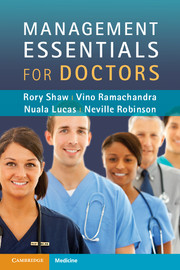Book contents
- Frontmatter
- Contents
- Contributors
- Foreword
- Preface
- Acknowledgements
- Section 1 Core knowledge
- Section 2 Core skills
- Section 3 Important bodies
- Chapter 19 General Medical Council
- Chapter 20 National Clinical Assessment Service
- Chapter 21 National Confidential Enquiry into Patient Outcome and Death
- Chapter 22 National Institute for Health and Clinical Excellence
- Chapter 23 Postgraduate Medical Education and Training Board
- Section 4 Information, evidence and research
- Section 5 Money
- Section 6 NHS structures
- Section 7 Operations
- Section 8 Safety and quality
- Section 9 Staff issues
- Index
Chapter 23 - Postgraduate Medical Education and Training Board
Published online by Cambridge University Press: 05 March 2012
- Frontmatter
- Contents
- Contributors
- Foreword
- Preface
- Acknowledgements
- Section 1 Core knowledge
- Section 2 Core skills
- Section 3 Important bodies
- Chapter 19 General Medical Council
- Chapter 20 National Clinical Assessment Service
- Chapter 21 National Confidential Enquiry into Patient Outcome and Death
- Chapter 22 National Institute for Health and Clinical Excellence
- Chapter 23 Postgraduate Medical Education and Training Board
- Section 4 Information, evidence and research
- Section 5 Money
- Section 6 NHS structures
- Section 7 Operations
- Section 8 Safety and quality
- Section 9 Staff issues
- Index
Summary
The Postgraduate Medical Education and Training Board (PMETB) was an independent statutory body, responsible for overseeing and promoting the development of postgraduate medical education and training for all specialties, including general practice, across the UK. It assumed its statutory powers on 30 September 2005, taking over the responsibilities of the Specialist Training Authority (STA) and the Joint Committee on Postgraduate Training for General Practice (JCPTGP). PMETB was funded by grants from the Department of Health in England, Northern Ireland, Scotland and Wales. The board consisted of 29 members, with 17 medical representatives, eight lay members and four observers from the UK health departments. Appointments were made by the Secretary of State for Health. The board had two statutory committees – the Training Committee and the Assessment Committee.
PMETB's statutory responsibilities included establishing, promoting, developing and maintaining standards and requirements for postgraduate medical education and training across the UK. Its core functions were:
Approving standards for assessments, trainers and training programmes submitted by medical Royal Colleges
Monitoring training through inspection visits and other arrangements
Awarding Certificates of Completion of Training (CCT)
Determining eligibility of doctors for inclusion on the specialist and GP registers
Setting the overarching principles under which selection into specialist training operate.
- Type
- Chapter
- Information
- Management Essentials for Doctors , pp. 65 - 68Publisher: Cambridge University PressPrint publication year: 2011



